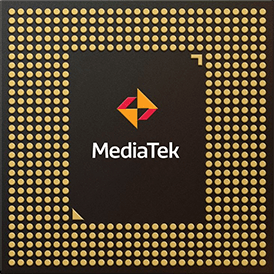
MediaTek Dimensity 1100 Benchmark, Test and specs
Last updated:
The MediaTek Dimensity 1100 has 8 cores with 8 threads and is based on the 2. gen of the Mediatek Dimensity series. The processor was released in Q1/2021. The MediaTek Dimensity 1100 scores 742 points in the Geekbench 5 single-core benchmark. In the Geekbench 5 multi-core benchmark, the result is 2,853 points.

| Name: | MediaTek Dimensity 1100 |
|---|---|
| Family: | Mediatek Dimensity (36) |
| CPU group: | MediaTek Dimensity 1100/1200/1300 (3) |
| Architecture: | Cortex-A78 / Cortex-A55 |
| Segment: | Mobile |
| Generation: | 2 |
| Predecessor: | -- |
| Successor: | -- |
CPU Cores and Base Frequency
The MediaTek Dimensity 1100 has 8 CPU cores and can calculate 8 threads in parallel. The clock frequency of the MediaTek Dimensity 1100 is 2.60 GHz. The number of CPU cores greatly affects the speed of the processor and is an important performance indicator.
| CPU Cores / Threads: | 8 / 8 |
|---|---|
| Core architecture: | hybrid (big.LITTLE) |
| A-Core: | 4x Cortex-A78 |
| B-Core: | 4x Cortex-A55 |
| Hyperthreading / SMT: | No |
|---|---|
| Overclocking: | No |
| A-Core Frequency: | 2.60 GHz |
| B-Core Frequency: | 2.00 GHz |
Internal Graphics
The MediaTek Dimensity 1100 has integrated graphics, called iGPU for short. Specifically, the MediaTek Dimensity 1100 uses the ARM Mali-G77 MP9, which has 144 texture shaders and 9 execution units. The iGPU uses the system's main memory as graphics memory and sits on the processor's die.
| GPU name: | ARM Mali-G77 MP9 |
|---|---|
| GPU frequency: | 0.85 GHz |
| GPU (Turbo): | No turbo |
| Compute units: | 9 |
| Shader: | 144 |
| Hardware Raytracing: | No |
| Release date: | Q2/2019 |
| Max. displays: | 1 |
|---|---|
| Generation: | Vallhall 1 |
| Direct X: | 12 |
| Technology: | 7 nm |
| Max. GPU Memory: | 4 GB |
| Frame Generation: | No |
Hardware codec support
A photo or video codec that is accelerated in hardware can greatly accelerate the working speed of a processor and extend the battery life of notebooks or smartphones when playing videos.
| h265 / HEVC (8 bit): | Decode / Encode |
|---|---|
| h265 / HEVC (10 bit): | Decode / Encode |
| h264: | Decode / Encode |
| VP8: | Decode / Encode |
| VP9: | Decode / Encode |
| AV1: | Decode |
|---|---|
| AVC: | Decode / Encode |
| VC-1: | Decode / Encode |
| JPEG: | Decode / Encode |
Memory & PCIeThe processor can use up to 16 GB memory in 4 (Quad Channel) memory channels. The maximum memory bandwidth is 34.1 GB/s. The memory type as well as the amount of memory can greatly affect the speed of the system. |
|
| Memory type: | Memory bandwidth: |
|---|---|
| LPDDR4X-4266 | 34.1 GB/s |
| Max. Memory: | 16 GB |
| Memory channels: | 4 (Quad Channel) |
| ECC: | No |
| PCIe: | |
| PCIe Bandwidth: | -- |
Thermal ManagementThe thermal design power (TDP for short) of the processor is . The TDP specifies the necessary cooling solution that is required to cool the processor sufficiently. The TDP usually gives a rough idea of the actual power consumption of the CPU. |
|
|---|---|
| TDP (PL1 / PBP): | |
| TDP (PL2): | -- |
| TDP up: | -- |
| TDP down: | -- |
| Tjunction max.: | -- |
Technical details
The MediaTek Dimensity 1100 is made in 6 nm. The smaller the manufacturing process of a CPU, the more modern and energy-efficient it is. Overall, the processor has 0.00 MB cache. A large cache can greatly speed up the processor's speed in some cases such as games.
| Technology: | 6 nm |
|---|---|
| Chip design: | Chiplet |
| Socket: | -- |
| L2-Cache: | -- |
| L3-Cache: | -- |
| AES-NI: | No |
| Operating systems: | Android |
| Virtualization: | None |
|---|---|
| Instruction set (ISA): | Armv8-A (64 bit) |
| ISA extensions: | -- |
| Release date: | Q1/2021 |
| Release price: | -- |
| Part Number: | MT6891Z/CZA |
| Documents: | Technical data sheet |
Rate this processor
Benchmark results

The benchmark results for the MediaTek Dimensity 1100 have been carefully checked by us. We only publish benchmark results that have been created by us or that have been submitted by a visitor and then checked by a team member. All results are based on and fullfill our benchmark guidelines.
Geekbench 5, 64bit (Single-Core)
Geekbench 5 is a cross plattform benchmark that heavily uses the systems memory. A fast memory will push the result a lot. The single-core test only uses one CPU core, the amount of cores or hyperthreading ability doesn't count.

|
Intel Core i7-4700HQ
4C 8T @ 3.40 GHz |
||

|
Intel Core i7-4700MQ
4C 8T @ 3.40 GHz |
||

|
Intel Core i5-7Y54
2C 4T @ 3.20 GHz |
||
|
|
MediaTek Dimensity 1100
8C 8T @ 2.60 GHz |
||

|
Samsung Exynos 9820
8C 8T @ 2.70 GHz |
||

|
Samsung Exynos 1280
8C 8T @ 2.40 GHz |
||

|
Intel Xeon E5-2696 v2
12C 24T @ 3.30 GHz |
||
Geekbench 5, 64bit (Multi-Core)
Geekbench 5 is a cross plattform benchmark that heavily uses the systems memory. A fast memory will push the result a lot. The multi-core test involves all CPU cores and taks a big advantage of hyperthreading.
|
|
HiSilicon Kirin 990 4G
8C 8T @ 2.86 GHz |
||
|
|
HiSilicon Kirin 990 5G
8C 8T @ 2.86 GHz |
||
|
|
HiSilicon Kirin 990E 5G
8C 8T @ 2.86 GHz |
||
|
|
MediaTek Dimensity 1100
8C 8T @ 2.60 GHz |
||

|
AMD Ryzen 5 2400GE
4C 8T @ 3.20 GHz |
||

|
Intel Core i7-3632QM
4C 8T @ 2.20 GHz |
||

|
Intel Core i7-4720HQ
4C 8T @ 3.40 GHz |
||
Geekbench 6 (Single-Core)
Geekbench 6 is a benchmark for modern computers, notebooks and smartphones. What is new is an optimized utilization of newer CPU architectures, e.g. based on the big.LITTLE concept and combining CPU cores of different sizes. The single-core benchmark only evaluates the performance of the fastest CPU core, the number of CPU cores in a processor is irrelevant here.

|
AMD Ryzen 3 3300U
4C 4T @ 3.50 GHz |
||

|
Intel Core i5-6300U
2C 4T @ 3.00 GHz |
||

|
Intel Core i5-6400T
4C 4T @ 2.80 GHz |
||
|
|
MediaTek Dimensity 1100
8C 8T @ 2.60 GHz |
||

|
Intel Core i7-4702MQ
4C 8T @ 3.20 GHz |
||

|
Intel Core i7-4702HQ
4C 8T @ 3.20 GHz |
||

|
AMD Ryzen 3 5125C
2C 4T @ 3.00 GHz |
||
Geekbench 6 (Multi-Core)
Geekbench 6 is a benchmark for modern computers, notebooks and smartphones. What is new is an optimized utilization of newer CPU architectures, e.g. based on the big.LITTLE concept and combining CPU cores of different sizes. The multi-core benchmark evaluates the performance of all of the processor's CPU cores. Virtual thread improvements such as AMD SMT or Intel's Hyper-Threading have a positive impact on the benchmark result.

|
MediaTek Dimensity 1300
8C 8T @ 3.00 GHz |
||

|
Intel Processor N100
4C 4T @ 3.00 GHz |
||

|
Qualcomm Snapdragon 865+
8C 8T @ 3.10 GHz |
||
|
|
MediaTek Dimensity 1100
8C 8T @ 2.60 GHz |
||

|
AMD Ryzen 5 3550H
4C 8T @ 3.00 GHz |
||

|
MediaTek Dimensity 1000+
8C 8T @ 2.60 GHz |
||

|
AMD Ryzen 7 3700C
4C 8T @ 2.70 GHz |
||
iGPU - FP32 Performance (Single-precision GFLOPS)
The theoretical computing performance of the internal graphics unit of the processor with simple accuracy (32 bit) in GFLOPS. GFLOPS indicates how many billion floating point operations the iGPU can perform per second.

|
Apple A12X Bionic
Apple A12X @ 1.13 GHz |
||

|
Intel Core i3-13300HE
Intel UHD Graphics 13th Gen (48 EU) @ 1.30 GHz |
||

|
Intel Core i3-13300HRE
Intel UHD Graphics 13th Gen (48 EU) @ 1.30 GHz |
||
|
|
MediaTek Dimensity 1100
ARM Mali-G77 MP9 @ 0.85 GHz |
||

|
MediaTek Dimensity 8050
ARM Mali-G77 MP9 @ 0.85 GHz |
||

|
MediaTek Dimensity 8020
ARM Mali-G77 MP9 @ 0.85 GHz |
||

|
MediaTek Dimensity 1300
ARM Mali-G77 MP9 @ 0.85 GHz |
||
AnTuTu 9 Benchmark
The AnTuTu 9 benchmark is very well suited to measuring the performance of a smartphone. AnTuTu 9 is quite heavy on 3D graphics and can now also use the "Metal" graphics interface. In AnTuTu, memory and UX (user experience) are also tested by simulating browser and app usage. AnTuTu version 9 can compare any ARM CPU running on Android or iOS. Devices may not be directly comparable when benchmarked on different operating systems.
In the AnTuTu 9 benchmark, the single-core performance of a processor is only slightly weighted. The rating is made up of the multi-core performance of the processor, the speed of the working memory, and the performance of the internal graphics.
In the AnTuTu 9 benchmark, the single-core performance of a processor is only slightly weighted. The rating is made up of the multi-core performance of the processor, the speed of the working memory, and the performance of the internal graphics.

|
MediaTek Dimensity 1200
8C 8T @ 3.00 GHz |
||

|
Qualcomm Snapdragon 865
8C 8T @ 2.84 GHz |
||

|
Apple A13 Bionic
6C 6T @ 2.65 GHz |
||
|
|
MediaTek Dimensity 1100
8C 8T @ 2.60 GHz |
||

|
Qualcomm Snapdragon 778G+
8C 8T @ 2.50 GHz |
||

|
Qualcomm Snapdragon 855 Plus
8C 8T @ 2.96 GHz |
||
|
|
HiSilicon Kirin 990 5G
8C 8T @ 2.86 GHz |
||
AnTuTu 8 Benchmark
The AnTuTu 8 Benchmark measures the performance of a SoC. AnTuTu benchmarks the CPU, GPU, Memory as well as the UX (User Experience) by simulating browser and app usage. AnTuTu can benchmark any ARM CPU that runs under Android or iOS. Devices may not be directly compareable if the benchmark has been performed under different operating systems.
In the AnTuTu 8 benchmark, the single-core performance of a processor is only slightly weighted. The evaluation consists of the multi-core performance of the processor, the speed of the RAM and the performance of the internal graphics.
In the AnTuTu 8 benchmark, the single-core performance of a processor is only slightly weighted. The evaluation consists of the multi-core performance of the processor, the speed of the RAM and the performance of the internal graphics.
|
|
HiSilicon Kirin 9000
8C 8T @ 3.13 GHz |
||

|
Qualcomm Snapdragon 870
8C 8T @ 3.20 GHz |
||

|
MediaTek Dimensity 1300
8C 8T @ 3.00 GHz |
||
|
|
MediaTek Dimensity 1100
8C 8T @ 2.60 GHz |
||
|
|
HiSilicon Kirin 9000E
8C 8T @ 3.13 GHz |
||

|
Apple A14 Bionic
6C 6T @ 3.00 GHz |
||

|
MediaTek Dimensity 1200
8C 8T @ 3.00 GHz |
||
Estimated results for PassMark CPU Mark
Some of the CPUs listed below have been benchmarked by CPU-monkey. However the majority of CPUs have not been tested and the results have been estimated by a CPU-monkey’s secret proprietary formula. As such they do not accurately reflect the actual Passmark CPU mark values and are not endorsed by PassMark Software Pty Ltd.

|
Intel Core i7-5700HQ
4C 8T @ 3.20 GHz |
||

|
Intel Core i5-6600
4C 4T @ 3.60 GHz |
||

|
Intel Core i5-7500
4C 4T @ 3.60 GHz |
||
|
|
MediaTek Dimensity 1100
8C 8T @ 2.60 GHz |
||

|
AMD FX-8350
8C 8T @ 4.10 GHz |
||

|
Intel Core i5-1030NG7
4C 8T @ 3.20 GHz |
||

|
Intel Core i7-8550U
4C 8T @ 2.40 GHz |
||
Benchmarks

Geekbench 5 (SC)
2,488 entries
2,488 entries

Geekbench 5 (MC)
2,461 entries
2,461 entries

Geekbench 6 (SC)
1,755 entries
1,755 entries

Geekbench 6 (MC)
1,703 entries
1,703 entries

FP32 SP (iGPU)
2,042 entries
2,042 entries

AnTuTu 9 Benchmark
90 entries
90 entries

AnTuTu 8 Benchmark
118 entries
118 entries

PassMark CPU-Mark
2,392 entries
2,392 entries
Popular comparisons
back to index





